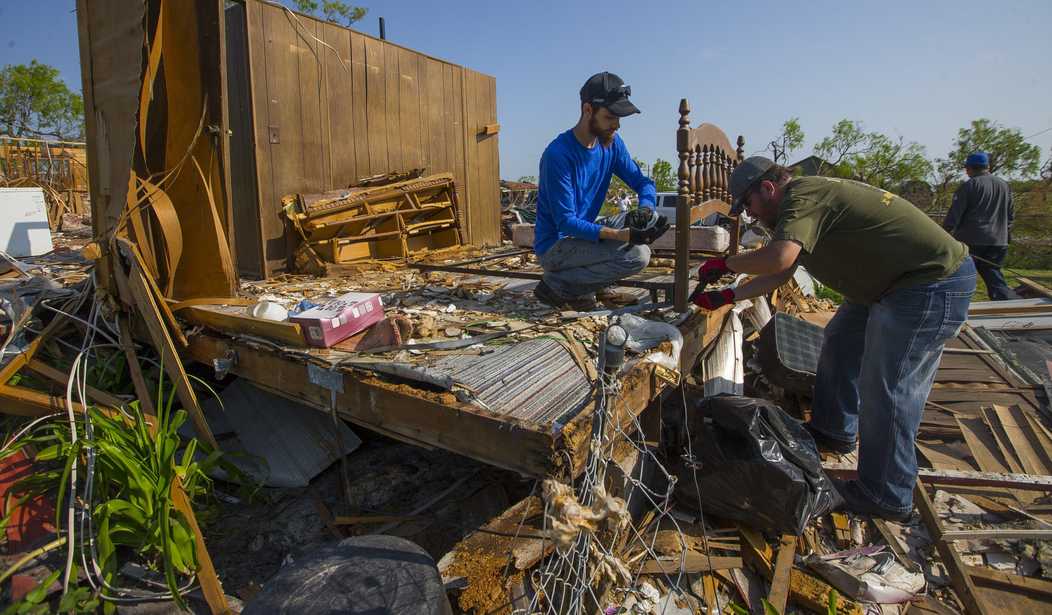WASHINGTON – As the U.S. tallies hundreds of billions of dollars in damage from hurricanes Harvey, Irma and Maria, President Obama’s FEMA administrator today pushed for the agency’s disaster deductible proposal.
The deductible would function much like a health insurance deductible, requiring states to cover a certain threshold for damages before federal support kicks in. Speaking at the Center for American Progress, former FEMA Administrator Craig Fugate described how Florida, a state with a $70 billion annual budget, might incur a $25 million deductible under the proposal.
The federal government would cover about 75 cents for every dollar incurred after the deductible. Fugate argued that the concept forces states to better plan for the future and develop resilient infrastructure through proper flood mapping. FEMA released its second disaster deductible proposal in January.
Estimates for the damage from Hurricane Harvey are as high as $190 billion, while Irma damage is estimated between $150 billion and $200 billion. Hurricane Maria’s impact on Puerto Rico is expected to cost between $45 billion and $95 billion. In 2016, the U.S. recorded 15 extreme weather events all exceeding $1 billion in damage; so far in 2017, there have been 11.
Fugate said that it’s time for Congress to stop writing checks for inevitable disasters and start finding ways to incentivize smart development that is adaptable to climate change. Fugate agreed with President Obama’s notion after Hurricane Sandy that the discussion about the existence of climate change is over, and instead the U.S. should be discussing “climate adaptation.”
“Why do we have to constantly respond to these extreme events that we know are going to happen, that if we had invested and made decisions to build resiliency to our infrastructures, we wouldn’t have lost everything?” Fugate said, suggesting that the nation’s flood insurance program will soon climb from $20 billion in debt to more than $30 billion. “These (natural hazards) will only become a disaster based upon how and where we build, and we need to change that dynamic.”
Fugate said that people cannot dispute the data on climate change, given the rising temperatures and sea levels. He said the only reason these “natural hazards” have become natural disasters is because of where cities are building infrastructure and the lack of investment in proper planning.
“(The disaster deductible) would force certain states on a lot of these smaller disasters to take more ownership — because these are the ones that are most frequently occurring — that decisions they make about how and where they build has a cost to it,” he said.
Fugate was asked about the likelihood of Congress investing in flood mapping and resilient development. He said there’s a good chance, given the “vigorous debate” he said boiled over within the administration after President Trump’s decision to temporarily waive the Jones Act for Puerto Rico.
Fugate said that the conversation following disasters always points to FEMA costs, but these are taxpayer dollars at work.
“I don’t know why everyone talks about FEMA money,” he said. “It ain’t FEMA’s money. We’re just the administrator of it. It’s your tax dollars. This billions of dollars will make the (Hurricane) Sandy supplement pale in comparison. Your tax dollars are about to be invested in one of the largest infrastructure projects across two states and the commonwealth.”
He said that in the wake of all these disasters, Congress has an opportunity to build for future risk so FEMA doesn’t have to come back time and time again to deal with the catastrophic consequences of damages for natural hazards. The realities, he said, don’t mean that cities can’t build in these areas, but policy makers need to keep future risks in mind.









Join the conversation as a VIP Member